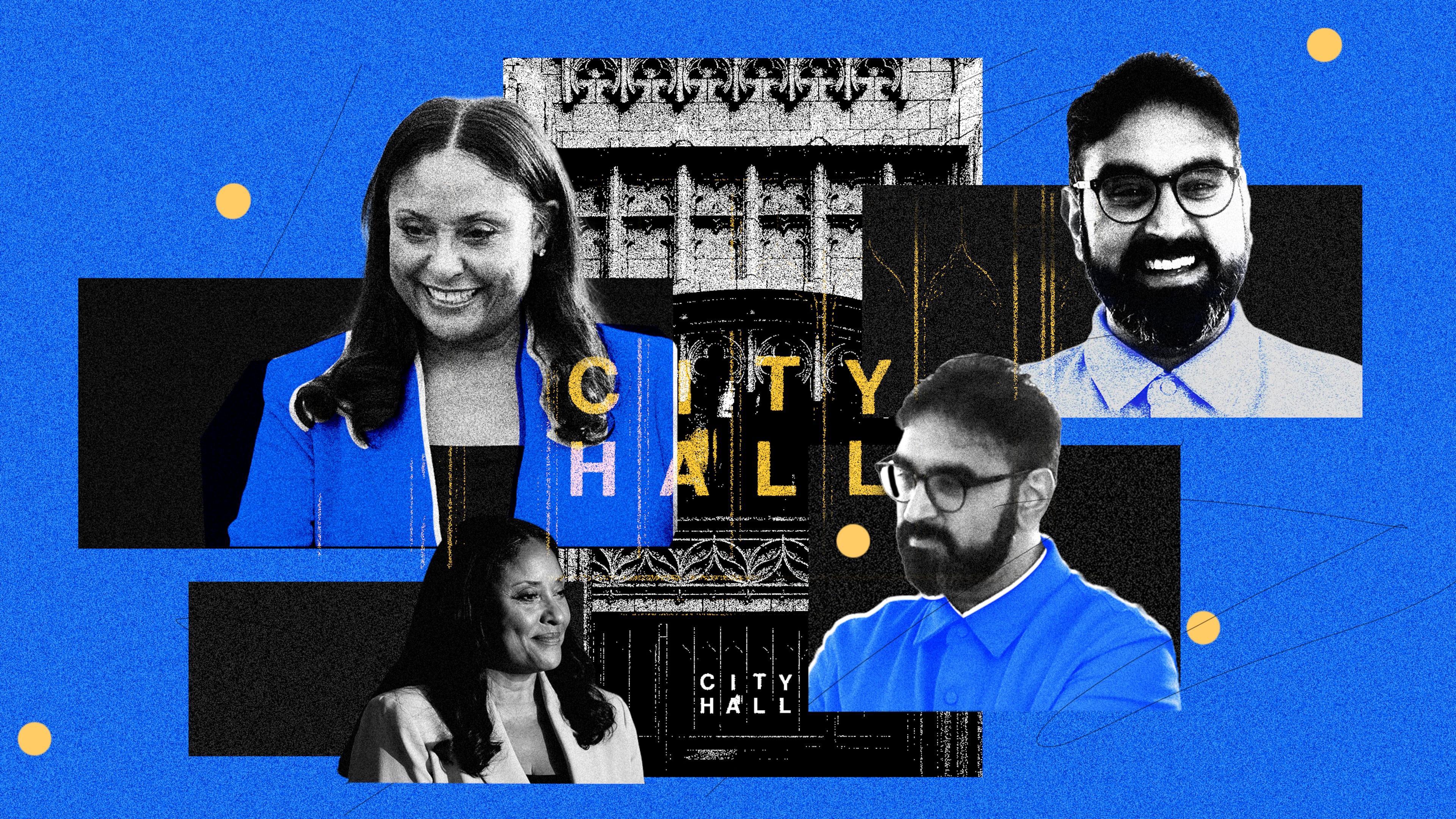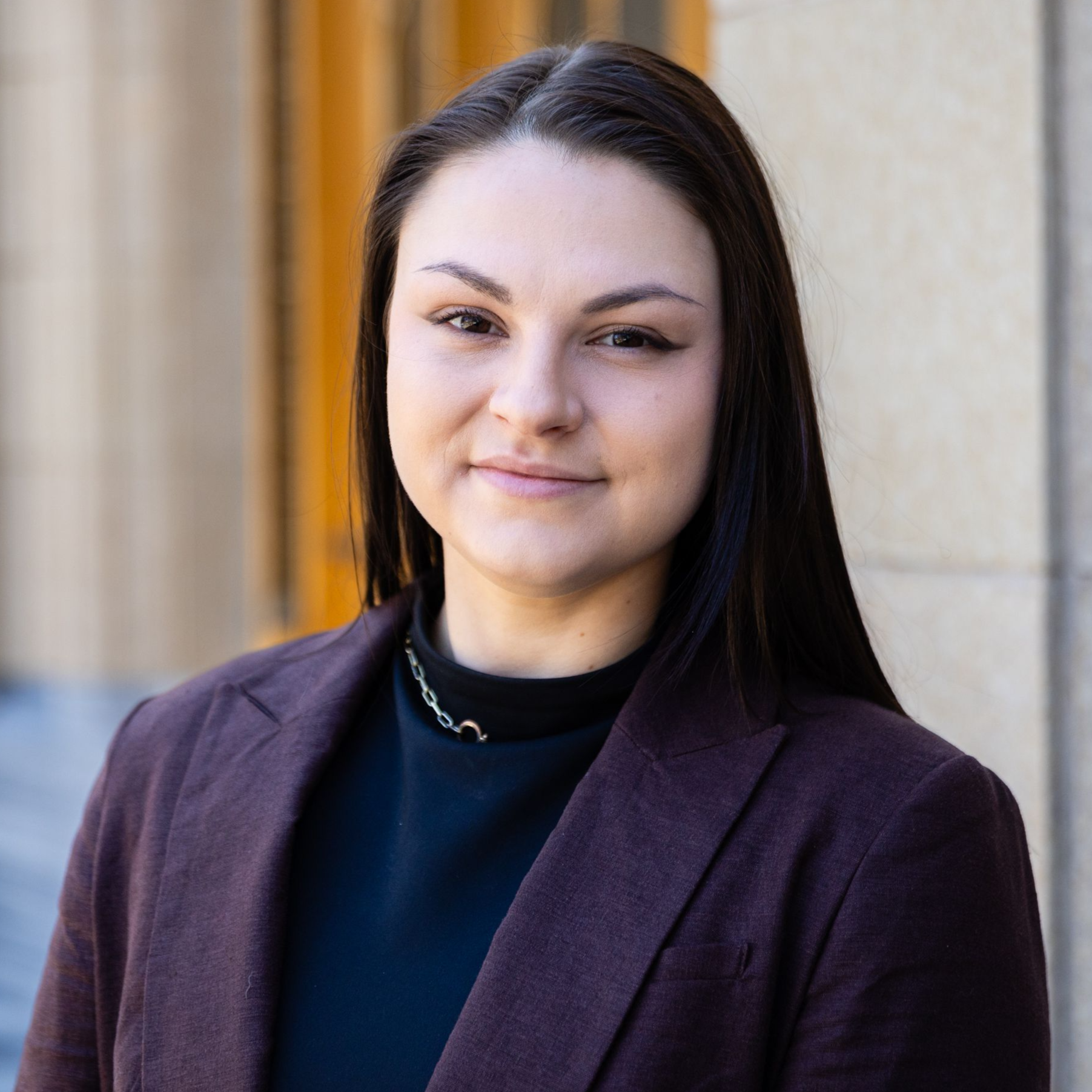Insider vs. Outsider: The race for Atlanta City Council president

It is a contest of political insider versus outsider in the race to be the Atlanta City Council’s next president.
The matchup features two-term council member Marci Collier Overstreet, with an endorsement in hand from Mayor Andre Dickens, against policy nonprofit leader Rohit Malhotra, a frequent critic of city leadership.
It’s a sharp choice for voters between Atlanta’s political establishment and change in an election for the second-most powerful position at City Hall.
The council president is responsible for running meetings; making key committee appointments; being an intermediary between the council and the mayor; casting tiebreaking votes on legislation; and filling in if the mayor is unable to serve.
Overstreet strongly supported the city’s public safety training center and helped lead the effort to overhaul Atlanta’s Office of Inspector General — policy views in line with the mayor’s office on legislation important for Dickens’ agenda.
The mayor has endorsed Overstreet, who would be a strong ally as he looks forward to an anticipated second term.

Dickens was among the first candidates to submit qualifying paperwork to the city clerk’s office Aug. 19 before holding a rally on the steps of City Hall. Overstreet followed minutes later and announced her candidacy in the same spot immediately after the mayor.
Her campaign slogan “Leading Atlanta Forward” is almost identical to Dickens’ “Moving Atlanta Forward” — a nod at the close ties between the two campaigns.
“I am exactly what the city needs right now,” Overstreet said. “We have been doing the work, and I will be the only one on the ballot that is ready.
“You heard what our mayor just said — he needs a partner that is ready to go on Day 1. That’s me.”
Malhotra is a champion of progressive policies and has been critical of both the Dickens administration and other mayors in the past. His nonprofit is especially known for examining spending of the city’s general fund budget.
Malhotra’s campaign plans to harness the support of younger, more progressive voters who might be frustrated with Atlanta’s political status quo.

That group includes thousands of people opposed to the city’s police training center — and who routinely spoke out against the facility at council meetings, promising retribution at the ballot box for council members who supported it.
The 38-year-old self-proclaimed “policy nerd” says he wants the position to be a bridge between City Hall and community organizations.
“We are the worst nightmare for establishment politics,” he said after qualifying on Aug. 20. “And it is because we are willing to tell the truth about Atlanta, because that’s how we love Atlanta.”
Malhotra: Race a ‘referendum on democracy’
Malhotra is the founder of the Center for Civic Innovation — a progressive policy nonprofit that has deep ties to the city’s advocacy community.
The organization has picked heated battles with city leadership in the past over the sale of Underground Atlanta to an out-of-state developer; the controversial city detention center lease agreement with Fulton County; and the highly debated public safety training center known by opponents as “Cop City.”

Malhotra was part of the effort to put the training center on the ballot through a referendum, which has been stalled in court for almost two years. Organizers say they collected more than 100,000 signatures — a well of potential voters that Malhotra’s campaign can tap, although its unclear how many signatures are valid.
“If they’re not going to let us have a referendum — which they didn’t — then this election will be a referendum on democracy,” Malhotra said at City Hall after qualifying for the race. “You cannot only build democracy with people that you agree with.”
The son of Indian immigrant parents, Malhotra frequently tells the story of his mother moving to the United States at age 19. He earned degrees from Emory University and Harvard University’s John F. Kennedy School of Government.
Before founding his policy nonprofit, Malhotra worked in communications for the Obama administration. His background is a prime target of opponents who say he isn’t a true Atlanta native.
“They’ll tell you that ‘he’s not Atlanta enough’ — I’ve already heard it,” Malhotra said. “These are the same tried and true things that have been used against movements for years.”

Progressive Democratic candidates across the country have had recent success. Atlanta organizers point to Zohran Mamdani, a democratic socialist who won the Democratic primary in New York City’s mayoral election.
Malhotra’s supporters — made up of a coalition of progressive organizations — say now is the time for a candidate to shake up Atlanta City Hall politics that they say leaves some residents behind.
“This is an opportunity for the people in the city of Atlanta,” Britney Whaley, with the Working Families Party, said at Malhotra’s qualification rally. “This (campaign) is for working class people. This is for people who have been left on the margins.”
Overstreet: ‘The mayor is with me’
The message couldn’t have been more different at Overstreet’s fundraiser campaign launch. Atlanta’s establishment politicians paint Malhotra as an extremist outsider who would halt smooth proceedings inside City Hall.
At the same Decatur Street field office where Kamala Harris and Jon Ossoff campaigns once operated, members of Atlanta’s political establishment gathered for the official start of Overstreet’s bid.
State Sen. Nan Orrock, a longtime supporter, warned that the contest won’t be easy.
“This will be a serious campaign — this is not a walk in the park,” Orrock said. “There are big muscle efforts to put somebody else in this president seat.
“It’s going to take work.”

Atlanta City Council and the mayor’s office rarely disagree publicly. And while outgoing City Council President Doug Shipman had an amicable relationship with the mayor, Overstreet stands side by side with him publicly.
“Y’all ever heard a song, ‘They Not Like Us?’ — that’s what this campaign reminds me of,” Courtney English, the mayor’s interim chief of staff, told the crowd at Overstreet’s campaign launch. “You’re going to see the whole lot of folks try to dip into the old Atlanta vibe.
“They not like us — that’s what I want you to remember.”
Overstreet has introduced and championed several Dickens administration initiatives on the council, including financial relief for businesses hurt by the city’s water crisis and legislation that aims at increasing fresh food access in underserved areas of the city.
Overstreet grew up in southwest Atlanta, in the district she has represented for two terms on the City Council. She attended E.A. Ware Elementary School — one of the city’s first Black elementary schools — and, like Dickens, graduated from Benjamin E. Mays High School.
She has a journalism degree from Georgia State University.
Overstreet warned supporters her opponent could “derail” Atlanta’s progress.
“Are we doing everything 100% correct and right at the city? Heck no,” Overstreet said. “But are we trying our absolute best and making sure that the best people are working together to get it done? Heck yes.”

Dickens and City Council members have seen crime rates drop significantly and the city’s affordable housing stock grow over the past four years.
But the next four years will bring major challenges.
The 2026 FIFA World Cup next summer will test the city’s infrastructure — including Atlanta’s crumbling water system that officials say needs a billion-dollar overhaul. And President Donald Trump’s decision to rollback crucial federal funding has forced local governments to find financial support elsewhere.
“Don’t let anybody tell you that now is the time to change everything,” Overstreet said. “The mayor is with me.
“This group project is doing just fine.”
Why council president matters
Behind closed doors, some council members have wondered why a council president is needed at all.
The position has only tie-breaking voting power and exists mainly to facilitate the flow of council meetings and make key committee chair assignments.
But presidents usually serve as close collaborators with the mayor’s office and are next in line should the mayor leave office.

“Any council president has to make a few decisions like how they are going to relate to … the mayor — that’s an important piece on how the tone is set and how those two relate to each other,” said Shipman, who is not seeking reelection. “And second is how involved the council president is in policymaking.”
Malhotra has an expanded vision for the role, particularly in creating legislation. He says collaboration with the mayor’s office and council members “does not require complacency.”
“The role of city council president is supposed to be an independent office that is focused on expanding the public’s imagination on what is possible for this city when it comes to public policy,” he said. “It is not a rubber stamp. It is checks and balances.”

During a recent meet-and-greet event for Malhotra at the Atlanta Preservation Center in Grant Park, attendees were given fake money symbolizing the city budget and asked to dole out how they would spend the funds.
Their spending was vastly different from Atlanta’s current financial choices — the group opted to spend 35% on the transportation department which is much higher than the 6% allotted by lawmakers.
And while public safety spending — specifically for the police, fire and corrections departments — makes up nearly half of Atlanta’s general fund budget, attendees only spent about 12% of their funds that.
The exercise on “participatory budgeting” hinted at the increased involvement of residents and community organizations that Malhotra hopes to bring to City Hall.
“I think the legislative process should not push things onto community,” he said. “I think we should actually hear from community about what they want to see and design legislation around that.”
Overstreet would take another approach to getting things done by utilizing her relationships with the mayor and council colleagues — who, she said, advocated for her to run.
“The city of Atlanta needs someone that is ready, rooted and most of all, respected,” she said. “Everyone on City Council respects the work that I’ve done for the past eight years, the mayor respects my work — he supports me and so does my City Council.”

Overstreet recently spearheaded efforts to expedite construction along Cascade Road that, business owners say, crippled them financially by clogging the roadway and limiting foot traffic to the area.
She also sponsored legislation that would provide financial relief for those small businesses. The proposal is expected to pass easily.
“That is just one example of where I did not run from the hard work that was necessary to get Cascade completed,” she said.
Alongside other city officials and southwest Atlanta business owners this week, the mayor and Overstreet celebrated the reopening of Cascade Road after nearly four years of construction.
“This is southwest Atlanta’s own,” Dickens said of Overstreet. “Don’t ever forget what real leadership looks like.”



